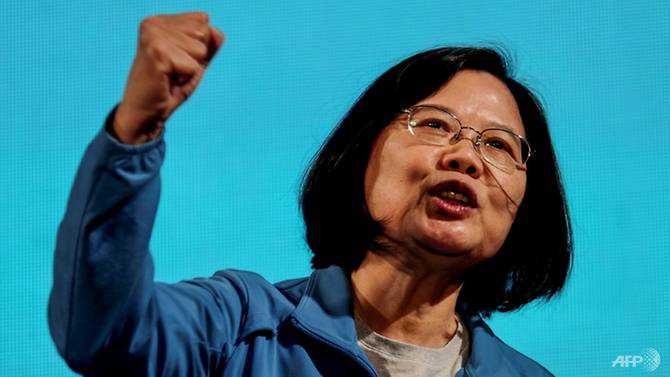Taiwan economy an electoral weak spot for Tsai despite strong record
08 January, 2020

Taiwan's President Tsai Ing-wen looks set to secure a second term in elections this weekend, but her Achilles heel is an economy that China has squeezed relentlessly in an effort to assert its control over the island's future.
Despite Beijing's pressure campaign, Tsai can boast a solid economic record, with the lowest unemployment for decades and strong export growth.
But her main challenger has gained traction by insisting Tsai's dismal relations with China bode badly for the island's longer-term prosperity.
Saturday's vote will have implications far beyond Taiwan's borders.
Taiwan has long been a potential flashpoint between China, which has vowed to one day seize the self-ruled island, regarding it as its own territory, and the United States, its main military ally.
With China-US relations deteriorating, observers are closely watching for the result and how Beijing might react.
Tsai, the island's first female leader, is riding high in the polls and has portrayed herself as a defender of Taiwan's liberal democracy against the increasingly authoritarian shadow cast by Beijing under President Xi Jinping.
Her main competitor Han Kuo-yu favours much warmer ties with China, saying it will boost the island's fortunes.
Han's campaign has stumbled, with many Taiwanese voters rattled by China's hardline response to protests in neighbouring Hong Kong and the mass internments of Uighur Muslims in Xinjiang.
But he has drawn blood on the economy, which Beijing has squeezed since Tsai took power in 2016 because her party rejects the idea that Taiwan is part of "one China".
"My goal as the president is very clear: 'Taiwan safe, people rich'," Han said during a recent televised debate, repeating what has become his main mantra.
"Taiwanese people have been living very difficult lives in the past three and a half years," he added.
"I CAN'T RETIRE"
With Taiwan being a comparative economic minnow that remains hugely reliant on the mainland, that message has resonated among many, especially those with Chinese business interests.
Tsai Pao-shin, a former supporter of the ruling Democratic Progressive Party (DPP) and an executive secretary of a fishing association in Kaohsiung, said he planned to vote for Han.
"(President) Tsai's policy is anti-China. We can't sell our products to China and there are fewer mainland tourists to Taiwan," he told AFP. "Discord between the two sides is not doing anyone any good."
"Business is scarce without mainland tourists," complained Mai Da-wei, a 68-year-old driver and tour guide in Taipei who said he could not afford to retire.
On paper, Taiwan boasts some enviable economic data.
Despite Beijing tightening the screws and the island finding itself in the midst of the US-China trade war, the economy has grown for 14 consecutive quarters since Tsai took office as she touted for fresh business and tourists across Asia.
Taiwanese companies on the mainland have also pledged US$23 billion worth of investment to bring their manufacturing back, unemployment remains low and the stock market has witnessed its best year in a decade.
At a rally last weekend in central Taiwan, Tsai accused the opposition Kuomintang party of having a business strategy that was little more than "rely on China".
Yet in polling, the economy weighs heavily with voters.
Bonnie Glaser, an expert at the Center for Strategic and International Studies, said Taiwan still had "stagnant wages and a wide income gap" despite its economic success.
"I also think that many in Taiwan compare their economic growth rate unfavourably to mainland China, rather than to other advanced economies, which is a better comparison," she added.
Taiwan's third-quarter GDP grew 2.9 per cent this year, far outpacing places such as Hong Kong, Singapore, South Korea and Japan.
TURNOUT KEY
Most projections so far see Tsai comfortably winning a second term but turnout will be key.
Her DPP is popular with younger voters who are more likely to boast a strong Taiwanese identity and support socially progressive issues like gay marriage - Taiwan became the first place in Asia to legalise same-sex weddings last year.
The KMT tends to poll more strongly with older, socially conservative voters who usually favour stronger ties with the mainland, identify as Chinese and have a better record of turning up on election day.
But Han's own track record has not helped his cause.
A plain-speaking political outsider, he stormed to victory in 2018 to become mayor of Kaohsiung city, a traditional DPP heartland, on a vow to make its inhabitants "filthy rich".
Some six months later he was campaigning for the president's office.
"Kaohsiung didn't get 'filthy rich' in the past year as Han promised," said Fan Shih-ping, a political scientist at National Taiwan Normal University. "So why would voters be convinced that he can do it now?"
Source:
TAG(s):
